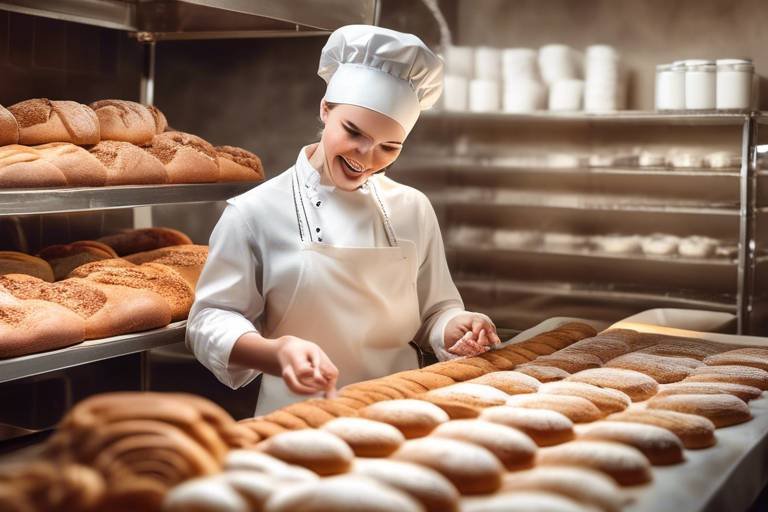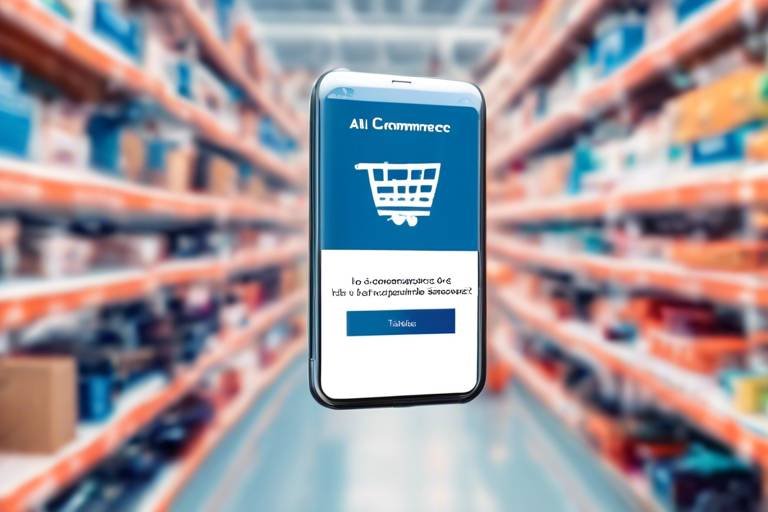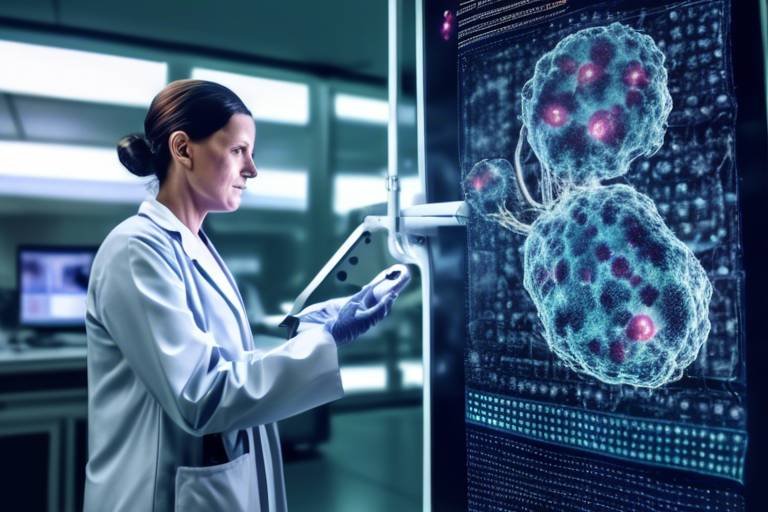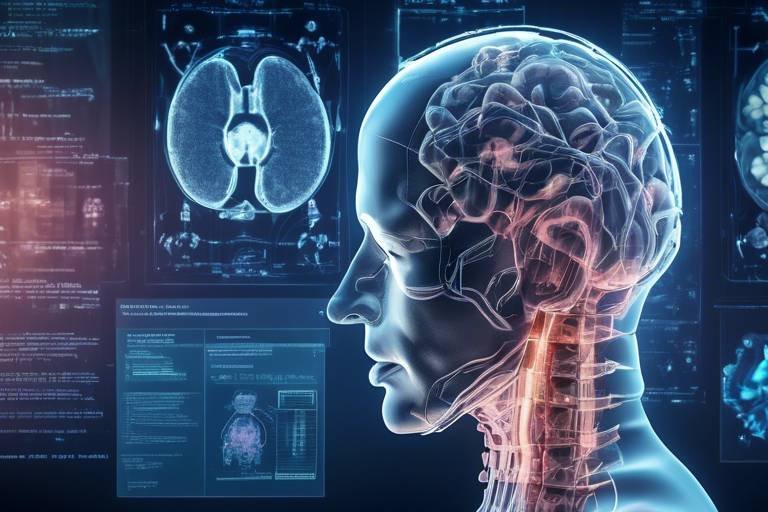AI in Bakery Industry: Changing the Recipe of Success
In recent years, the bakery industry has witnessed a remarkable transformation, thanks to the integration of artificial intelligence (AI). This technological revolution is not just a trend; it’s a profound shift that is changing the way bakeries operate, enhancing production efficiency, and creating a more personalized customer experience. Imagine walking into your favorite bakery and being greeted with a selection of pastries that perfectly match your taste buds—this is the magic of AI at work. By harnessing the power of data and machine learning, bakeries are now able to streamline their operations, reduce waste, and innovate like never before. In this article, we will explore the various ways AI is reshaping the bakery landscape, making it more efficient, customer-centric, and innovative.
One of the most significant advantages of AI in the bakery industry is its ability to enhance production efficiency. Traditional baking processes often involve guesswork and manual labor, which can lead to inconsistencies and waste. However, with AI technologies, bakeries can optimize their operations in several ways. For instance, AI algorithms can analyze ingredient usage patterns, helping bakers determine the ideal quantities needed for each batch. This not only reduces waste but also leads to substantial cost savings. Imagine a bakery that used to throw away 20% of its ingredients due to overproduction; with AI, that number could drop to just 5%. The result? Increased productivity and a healthier bottom line.
Have you ever wondered why your favorite bakery seems to know exactly what you want? That’s the power of AI at play! By analyzing customer preferences and purchase history, bakeries can create personalized marketing strategies that enhance customer satisfaction. For example, if a customer frequently buys chocolate croissants, the bakery can send them special offers or notifications when fresh batches are available. This level of personalization not only fosters customer loyalty but also increases sales. In a world where consumers crave unique experiences, bakeries leveraging AI are ahead of the curve.
Utilizing AI-driven predictive analytics, bakeries can accurately forecast demand. This means they produce the right amount of products to meet customer needs while minimizing excess inventory. Imagine a bakery that can predict a surge in demand for pumpkin spice muffins during the fall season. By analyzing historical sales data and current trends, AI helps bakers prepare in advance, ensuring they never run out of popular items. This not only satisfies customers but also maximizes profits.
Another area where AI shines is in inventory management. Managing inventory levels effectively is crucial for bakeries to reduce spoilage and ensure fresh ingredients are always available for production. AI systems can track inventory in real-time, alerting bakers when stock levels are low or when certain ingredients are nearing expiration. This proactive approach minimizes waste and ensures that every loaf of bread or pastry is made with the freshest ingredients possible.
By leveraging AI, bakeries can also optimize their supply chains. Timely deliveries of ingredients are essential for smooth operations, and AI can help bakeries manage their suppliers more efficiently. For example, AI systems can analyze supplier performance and predict potential delays, allowing bakeries to adjust their orders accordingly. This not only improves operational efficiency but also helps maintain the quality of the final products.
AI isn't just about efficiency; it's also a catalyst for recipe innovation. With the help of AI tools, bakers can experiment with new flavors and ingredients, leading to exciting recipes that cater to evolving consumer tastes and dietary preferences. Imagine a baker using AI to create a gluten-free, vegan chocolate cake that tastes just as delicious as its traditional counterpart. The possibilities are endless, and AI is empowering bakers to push the boundaries of creativity.
Maintaining high standards of quality control is crucial in the bakery industry. AI technologies enable bakeries to ensure that every product meets consistent taste and texture expectations. By implementing computer vision and machine learning, bakeries can automate quality assessments, identifying defects in products before they reach the customer. This not only enhances customer satisfaction but also protects the bakery's reputation.
Using AI for automated quality assessment means that bakers can focus on creativity and innovation while technology handles the nitty-gritty details. Imagine a camera system that scans each batch of cookies, detecting any that are overcooked or misshapen. Only the best products make it to the display case, ensuring that customers receive top-notch quality every time.
AI-driven real-time monitoring systems help bakers track production processes, allowing for immediate adjustments to maintain quality standards throughout the baking cycle. This means that if a batch isn’t rising properly, bakers can tweak the temperature or humidity levels in real-time, ensuring that every product is baked to perfection.
As technology continues to evolve, the bakery industry is poised to embrace even more AI innovations. We can expect to see smarter processes that enhance customer engagement and improve operational efficiency. From advanced recipe development tools to AI-driven customer service chatbots, the future of baking looks bright. Bakeries that adapt to these changes will not only survive but thrive in an increasingly competitive market.
- How is AI used in bakeries? AI is used in bakeries for optimizing production processes, personalizing customer experiences, managing inventory, and innovating recipes.
- Can AI help reduce food waste in bakeries? Yes, AI can analyze ingredient usage and forecast demand, helping bakeries produce the right amount of products and minimize waste.
- What are the benefits of using AI for customer engagement? AI allows bakeries to create personalized marketing strategies based on customer preferences, enhancing customer satisfaction and loyalty.
- How does AI improve quality control in baking? AI technologies can automate quality assessments and monitor production processes in real-time, ensuring consistent product quality.

Enhancing Production Efficiency
In the fast-paced world of the bakery industry, efficiency is key. Imagine a bustling bakery where the aroma of fresh bread fills the air, and customers line up for their favorite treats. Behind this delightful scene, however, lies a complex web of operations that can make or break a business. This is where artificial intelligence (AI) comes into play, transforming traditional baking methods into streamlined, efficient processes. With AI technologies, bakeries can optimize their operations, leading to significant cost savings and increased productivity.
One of the primary ways AI enhances production efficiency is through the optimization of ingredient usage. By utilizing sophisticated algorithms, bakeries can accurately determine the exact amount of ingredients needed for each batch, reducing waste and ensuring that nothing goes to waste. This not only saves money but also contributes to a more sustainable operation. For instance, a bakery that traditionally used 100 pounds of flour for a specific product might find that AI suggests only 90 pounds, thus saving 10 pounds of flour per batch. Over time, these savings can add up significantly.
Moreover, AI can analyze historical data to identify patterns in production. This allows bakeries to predict busy periods and adjust their production schedules accordingly. For example, if a bakery notices that Fridays see a surge in demand for pastries, they can ramp up production on Thursdays. This proactive approach minimizes the risk of running out of popular items and maximizes sales potential. Additionally, by understanding peak times, bakeries can better allocate their staff, ensuring that the right number of bakers and assistants are on hand to meet demand.
Another fascinating aspect of AI in the bakery industry is its ability to facilitate real-time monitoring of production processes. With sensors and IoT devices, bakers can track everything from oven temperatures to dough consistency. This level of oversight allows for immediate adjustments, ensuring that every product meets the high standards customers expect. Imagine a scenario where a batch of cookies starts to overbake; AI can alert the baker instantly, allowing them to pull the cookies out at just the right moment, preserving that perfect texture.
Furthermore, AI-driven systems can assist in inventory management, ensuring that bakeries maintain the right stock levels. By analyzing sales data and predicting future demand, AI helps bakeries avoid both overstock and stockouts. This not only reduces spoilage of perishable ingredients but also ensures that fresh ingredients are always available for production. In a nutshell, AI is the secret ingredient that helps bakeries whip up success, making operations smoother, faster, and more efficient.
As we continue to explore the impact of AI in the bakery industry, it’s clear that these technologies are not just trends; they are the future of baking. By embracing AI, bakeries can enhance their production efficiency, leading to happier customers and a more profitable business.

Personalizing Customer Experience
In today's fast-paced world, where consumer preferences are as diverse as the pastries on a bakery's shelf, personalization has become the secret ingredient to delight customers. Imagine walking into your favorite bakery and being greeted not just with a smile, but with a selection of treats that perfectly match your taste buds. This is where artificial intelligence (AI) steps in to transform the customer experience. By harnessing the power of AI, bakeries can dive deep into customer data, analyzing preferences and purchase history to tailor their offerings in ways that were previously unimaginable.
Through sophisticated algorithms, bakeries can identify patterns in customer behavior. For instance, if a customer frequently buys chocolate croissants on weekends, AI can alert the bakery to prepare more of these delectable treats in anticipation of demand. This not only enhances customer satisfaction but also boosts sales as customers feel valued and understood. But it doesn't stop there; bakeries can also leverage AI to send personalized marketing messages, ensuring that customers are informed about new products, promotions, or even their favorite seasonal items.
Furthermore, AI can help bakeries segment their customer base into different categories based on preferences, demographics, and buying habits. This segmentation allows for more targeted marketing strategies. For example, a bakery might discover that a significant portion of its clientele is health-conscious. With this insight, they can introduce a line of gluten-free or low-sugar options, effectively catering to this specific audience. The result? A more engaged customer base and increased loyalty.
To illustrate the impact of AI on customer personalization, consider the following table:
| AI Application | Benefit |
|---|---|
| Data Analysis | Identifies customer preferences and trends |
| Targeted Marketing | Delivers personalized promotions and product recommendations |
| Customer Segmentation | Enables tailored offerings for different customer groups |
| Feedback Analysis | Improves products based on customer reviews and suggestions |
With AI's ability to analyze vast amounts of data, bakeries can also gather feedback in real-time, allowing them to adapt quickly to changing consumer tastes. This agility is crucial in a market where trends can shift overnight. By implementing AI-driven feedback loops, bakeries can refine their recipes and improve their product lineup based on what customers are saying, ensuring that they remain relevant and appealing.
In essence, the integration of AI into the bakery industry is not just about keeping up with technology; it's about creating a customer-centric approach that fosters loyalty and satisfaction. As bakeries continue to embrace these innovations, they will not only enhance the customer experience but also pave the way for a future where every customer's visit feels uniquely special.
- How does AI improve customer experience in bakeries? AI analyzes customer data to personalize offerings, ensuring customers receive recommendations that align with their preferences.
- Can AI help bakeries predict customer demand? Yes, AI uses predictive analytics to forecast demand, allowing bakeries to prepare the right amount of products.
- What role does customer feedback play in AI personalization? AI can analyze customer feedback in real time, enabling bakeries to adapt their products according to customer tastes.

Predictive Analytics for Demand Forecasting
In the fast-paced world of the bakery industry, understanding customer demand is akin to having a crystal ball. Predictive analytics has emerged as a game-changer, allowing bakeries to anticipate customer needs with remarkable accuracy. By leveraging historical sales data, seasonal trends, and even external factors such as local events or holidays, AI-driven tools can forecast demand effectively. This not only helps bakeries produce the right amount of products but also significantly reduces the risk of overproduction and waste.
Imagine a bakery that sells a variety of pastries. On a typical weekday, they may sell a certain number of croissants, danishes, and muffins. However, during the holiday season, those numbers can skyrocket. With predictive analytics, the bakery can analyze past sales data from previous years and identify patterns. For instance, if they notice a consistent spike in croissant sales during the week leading up to Christmas, they can adjust their production schedules accordingly. This proactive approach ensures that they have enough stock to meet customer demand without overstuffing their shelves with unsold goods.
Furthermore, predictive analytics allows bakeries to optimize their production schedules. By understanding peak demand times, bakers can plan their baking cycles more efficiently. For example, if data shows that early morning sales are significantly higher than afternoon sales, bakers can adjust their baking times to ensure fresh products are available when customers are most likely to purchase them. This not only enhances customer satisfaction but also maximizes the bakery's operational efficiency.
To illustrate the impact of predictive analytics, consider the following table that outlines the potential benefits bakeries can experience by implementing this technology:
| Benefit | Description |
|---|---|
| Reduced Waste | Minimizes excess production and spoilage by aligning output with actual demand. |
| Cost Savings | Lower operational costs by optimizing ingredient usage and labor hours. |
| Increased Customer Satisfaction | Ensures popular items are always available, enhancing the overall customer experience. |
| Improved Inventory Management | Streamlines inventory levels, ensuring fresh ingredients are always on hand. |
In conclusion, the integration of predictive analytics in the bakery industry is not just a trend; it is a necessity for those looking to thrive in a competitive market. By harnessing the power of data, bakeries can make informed decisions that lead to increased efficiency, reduced waste, and ultimately, a better experience for their customers. As we continue to embrace technological advancements, the future of baking looks brighter than ever, filled with opportunities for innovation and growth.
- What is predictive analytics? Predictive analytics involves using statistical algorithms and machine learning techniques to identify the likelihood of future outcomes based on historical data.
- How can bakeries benefit from predictive analytics? Bakeries can optimize production schedules, reduce waste, improve inventory management, and enhance customer satisfaction through better demand forecasting.
- Is predictive analytics expensive to implement? While there may be initial costs associated with software and training, the long-term savings and efficiency gains often outweigh these costs.
- Can small bakeries use predictive analytics? Yes, there are various affordable tools available that cater to small businesses, making it accessible for bakeries of all sizes.

Inventory Management Optimization
In the fast-paced world of the bakery industry, inventory management is a critical aspect that can make or break a business. With the integration of artificial intelligence, bakeries are now equipped to optimize their inventory levels like never before. Imagine a world where you never run out of essential ingredients or, conversely, have to throw away excess stock due to spoilage. Sounds dreamy, right? Well, AI is turning that dream into reality!
AI technologies utilize advanced algorithms to analyze sales data, production schedules, and even seasonal trends. This data-driven approach allows bakeries to maintain optimal inventory levels, ensuring that they have just the right amount of ingredients on hand. For instance, if a bakery notices a spike in demand for a specific pastry during a holiday season, AI can alert them to increase their stock of necessary ingredients ahead of time. This proactive strategy not only minimizes waste but also maximizes customer satisfaction by ensuring that popular items are always available.
Furthermore, AI can help bakeries automate their ordering processes. By predicting when stocks will run low based on historical data, bakeries can automate reordering, ensuring that fresh ingredients are always on hand. This is particularly important for perishable items like flour, eggs, and dairy products, where freshness is key. The result? A seamless operation that keeps the bakery running like a well-oiled machine.
To illustrate the impact of AI on inventory management, consider the following table that highlights the differences between traditional inventory management methods and AI-driven approaches:
| Aspect | Traditional Methods | AI-Driven Methods |
|---|---|---|
| Forecasting Demand | Based on historical sales and intuition | Data-driven predictions using machine learning |
| Reordering Process | Manual tracking and ordering | Automated reordering based on predictive analytics |
| Waste Management | High levels of spoilage due to overstock | Minimized waste through precise inventory control |
| Customer Satisfaction | Inconsistent product availability | Consistent availability of popular items |
By embracing AI-driven inventory management, bakeries can not only save costs but also enhance their operational efficiency. The ability to predict demand accurately and manage stock levels in real-time allows bakers to focus on what they do best—creating delicious products that delight customers. In a nutshell, optimizing inventory management through AI is like having a secret ingredient that guarantees success in the competitive bakery landscape.
- How does AI improve inventory management in bakeries? AI analyzes data to predict demand, automate reordering, and reduce waste, ensuring optimal stock levels.
- What are the benefits of using AI for inventory management? Benefits include cost savings, reduced spoilage, and improved customer satisfaction through consistent product availability.
- Can AI help with perishable ingredients? Yes, AI can monitor stock levels and predict when fresh ingredients need to be reordered to maintain quality.

Supply Chain Efficiency
In the ever-evolving world of the bakery industry, efficiency is the name of the game. With the integration of AI technologies, bakeries are not just keeping pace; they are redefining how supply chains operate. Imagine a well-oiled machine where ingredients flow seamlessly from suppliers to ovens, all while minimizing delays and maximizing freshness. This is the power of AI in supply chain management.
One of the primary benefits of AI is its ability to analyze vast amounts of data in real-time. By leveraging predictive analytics, bakeries can anticipate demand fluctuations with remarkable accuracy. For instance, if a particular pastry is trending on social media, AI can quickly adjust production schedules to ensure that supply meets this sudden spike in demand. This proactive approach not only enhances customer satisfaction but also minimizes the risk of overproduction and waste.
Furthermore, AI can optimize logistics by identifying the most efficient routes for ingredient delivery. This means that fresh produce can arrive at the bakery quicker, ensuring that the quality of the ingredients is maintained. For bakeries that pride themselves on using locally sourced ingredients, this is particularly crucial. By utilizing AI-driven tools, they can also keep track of supplier performance, ensuring that they work with the best partners who can deliver on time and maintain quality standards.
To illustrate the impact of AI on supply chain efficiency, consider the following table that highlights key areas where AI makes a difference:
| Area | Traditional Method | AI-Driven Approach |
|---|---|---|
| Demand Forecasting | Historical sales data | Real-time data analysis and predictive modeling |
| Logistics Management | Manual route planning | Automated route optimization |
| Supplier Evaluation | Periodic reviews | Continuous performance tracking and analytics |
Moreover, AI can facilitate better communication between all stakeholders in the supply chain. By implementing AI chatbots or automated messaging systems, bakeries can ensure that everyone from suppliers to delivery personnel is on the same page. This minimizes miscommunication and ensures that everyone knows exactly what is needed and when.
In conclusion, the integration of AI in supply chain management is not just a trend; it's a revolution. Bakeries that adopt these technologies are not only enhancing their operational efficiency but also setting themselves up for long-term success in a competitive market. As AI continues to evolve, we can expect even more innovative solutions that will further streamline processes and improve the overall baking experience.
- How does AI improve supply chain efficiency in bakeries?
AI enhances supply chain efficiency by providing real-time data analysis, optimizing logistics, and improving demand forecasting. - What are the benefits of using AI in bakery supply chains?
The benefits include reduced waste, improved freshness of ingredients, better supplier management, and enhanced customer satisfaction. - Can AI help in predicting customer demand?
Yes, AI can analyze trends and historical data to accurately predict customer demand, allowing bakeries to adjust production accordingly.

Recipe Innovation through AI
In the dynamic world of baking, innovation is the secret ingredient that keeps customers coming back for more. With the advent of artificial intelligence, bakers are now equipped with tools that not only enhance traditional recipes but also pave the way for entirely new creations. Imagine a world where your favorite pastry can be customized to your specific taste buds, or where a bakery can introduce a new flavor combination that perfectly aligns with current food trends. This is not just a dream; it's the reality brought about by AI!
AI technologies are revolutionizing the way bakers approach recipe development. By analyzing vast amounts of data, including consumer preferences, seasonal trends, and even nutritional information, AI can suggest innovative combinations of ingredients that bakers might not have considered. For instance, if a bakery wants to create a healthier version of a classic dessert, AI can analyze which substitutions work best without compromising taste. This ability to experiment with flavors and textures leads to exciting new products that cater to a diverse range of dietary needs.
Moreover, AI can assist in the testing phase of new recipes. Traditionally, bakers would have to rely on trial and error, which can be time-consuming and costly. With AI, they can simulate how different ingredients interact, predict the final product's taste and texture, and even optimize baking times and temperatures. This not only saves time but also ensures that the final product is consistently high-quality.
To illustrate how AI is changing recipe innovation, consider the following table that highlights some of the key benefits:
| Benefit | Description |
|---|---|
| Enhanced Creativity | AI can suggest unique ingredient pairings that bakers may not think of, leading to original recipes. |
| Data-Driven Decisions | By analyzing consumer data, bakers can create products that are more likely to succeed in the market. |
| Efficiency in Testing | Simulations reduce the need for physical trials, allowing for quicker recipe iterations. |
| Customization | AI can help create personalized recipes based on individual customer preferences. |
In conclusion, the infusion of AI into the baking process is like adding a pinch of magic to a classic recipe. It opens up a world of possibilities, allowing bakers to innovate in ways that were previously unimaginable. As consumer tastes continue to evolve, those bakeries that embrace AI-driven recipe innovation will not only keep their offerings fresh but also create a loyal customer base eager to try the next big thing. So, the next time you bite into a delicious pastry, remember that AI might just be the unsung hero behind that delightful flavor!
- How does AI help in recipe development? AI analyzes consumer preferences and ingredient interactions to suggest innovative recipes.
- Can AI predict the success of a new product? Yes, by using data analytics, AI can help bakers understand market trends and consumer demands.
- Is AI only useful for large bakeries? No, even small bakeries can benefit from AI tools to enhance their recipe innovation and customer engagement.

Quality Control and Consistency
In the ever-evolving world of baking, maintaining quality control and consistency is paramount. Imagine stepping into a bakery, the aroma of freshly baked bread enveloping you, only to find that the pastries taste different every time you visit. Disappointing, right? This is where artificial intelligence steps in to save the day. By integrating AI technologies, bakeries can ensure that every loaf of bread, every cupcake, and every cookie meets the same high standards, no matter when or where they are made.
AI technologies are revolutionizing the way bakeries approach quality control. With the help of computer vision and machine learning, automated quality assessments can be performed with incredible accuracy. Imagine a camera system that scans each product as it comes off the production line, identifying any defects or inconsistencies in real-time. This means that only the best products make it to the display case, ensuring that customers receive the quality they expect and deserve.
Furthermore, AI-driven real-time monitoring systems provide bakers with the ability to track production processes closely. These systems can monitor variables such as temperature, humidity, and baking times, allowing for immediate adjustments to be made if something goes awry. For example, if the oven temperature fluctuates unexpectedly, the system can alert the baker to make necessary changes, preventing a batch of cookies from becoming overcooked or underbaked. This level of precision is not just a luxury; it’s a necessity in today’s competitive market.
To illustrate the impact of AI on quality control, consider the following table showcasing how traditional methods compare to AI-enhanced processes:
| Aspect | Traditional Methods | AI-Enhanced Methods |
|---|---|---|
| Quality Assessment | Manual inspection by staff | Automated computer vision analysis |
| Monitoring | Periodic checks | Continuous real-time monitoring |
| Response Time | Slow, reactive adjustments | Immediate, proactive adjustments |
| Consistency | Variable, dependent on staff | High, data-driven consistency |
By leveraging these advanced technologies, bakeries not only enhance their quality control but also foster a culture of consistency that builds customer trust. When customers know they can rely on their favorite bakery to deliver the same delicious experience every time, they are more likely to return. This loyalty is invaluable in a market where options are plentiful.
In conclusion, the integration of AI in quality control processes is a game-changer for the bakery industry. It not only ensures that products meet the highest standards but also enhances overall operational efficiency. As bakeries continue to embrace these innovations, the future looks bright for both bakers and their customers alike.
- How does AI improve quality control in bakeries?
AI improves quality control by automating the assessment process, allowing for real-time monitoring and immediate adjustments to production variables. - What technologies are used in AI quality control?
Technologies such as computer vision and machine learning are commonly used to analyze product quality and consistency. - Can AI help reduce waste in bakeries?
Yes, by ensuring products meet quality standards and optimizing production processes, AI can significantly reduce waste.

Automated Quality Assessment
In the fast-paced world of baking, where consistency is key, has emerged as a game-changer. Imagine walking into a bakery where every loaf of bread, pastry, or cake is scrutinized with the precision of a master baker, thanks to advanced technology. This is not just a dream; it’s the reality brought forth by artificial intelligence (AI) and machine learning. These technologies enable bakeries to implement automated systems that assess the quality of their products in real-time, ensuring that every item meets the highest standards before it reaches the customer.
Utilizing computer vision technology, bakeries can now employ high-resolution cameras and sensors that analyze each product as it moves through the production line. These systems are designed to detect imperfections such as color inconsistencies, size variations, and surface defects. For instance, if a batch of cookies has an uneven bake or an undesirable shade, the AI can flag these issues immediately, allowing bakers to make necessary adjustments on the spot. This not only enhances the overall quality of baked goods but also significantly reduces waste caused by subpar products.
Moreover, the data collected from these assessments can be invaluable. By analyzing trends over time, bakeries can gain insights into common quality issues and make informed decisions to improve their processes. For example, if a particular type of bread consistently shows irregularities, bakers can adjust their recipes or baking times accordingly. This data-driven approach not only fosters a culture of continuous improvement but also ensures that customers receive products that are consistently delicious and visually appealing.
To illustrate the impact of automated quality assessment, consider the following table that outlines the benefits:
| Benefit | Description |
|---|---|
| Consistency | Ensures every product meets the same quality standards, enhancing customer satisfaction. |
| Efficiency | Reduces the time spent on manual inspections, allowing bakers to focus on creativity and production. |
| Waste Reduction | Minimizes the number of unsellable products, leading to lower costs and increased profitability. |
| Data Insights | Provides valuable information for improving recipes and baking processes based on quality trends. |
In conclusion, the integration of automated quality assessment in bakeries is not just about keeping up with technological advancements; it’s about redefining excellence in baking. By leveraging AI, bakers can ensure that every bite is a testament to quality, making a lasting impression on customers. As we look towards the future, it’s clear that those bakeries that embrace these innovations will not only thrive but also set the standard for what quality means in the bakery industry.
- What is automated quality assessment?
Automated quality assessment refers to the use of AI and machine learning technologies to evaluate the quality of baked goods in real-time, ensuring consistency and high standards. - How does computer vision work in bakeries?
Computer vision uses high-resolution cameras to analyze products, detecting defects such as color inconsistencies and size variations. - What are the benefits of using AI in bakeries?
AI helps improve consistency, efficiency, waste reduction, and provides valuable data insights for continuous improvement. - Can automated quality assessment reduce costs?
Yes, by minimizing waste and ensuring only high-quality products are sold, bakeries can significantly reduce costs and increase profitability.

Real-time Monitoring Systems
Imagine walking into a bakery where the aroma of freshly baked bread greets you, but what if I told you that behind that delightful experience lies a sophisticated web of technology? are revolutionizing how bakeries operate, allowing bakers to track every step of the production process with precision and ease. These systems employ advanced sensors and AI algorithms to monitor various parameters such as temperature, humidity, and baking times. By continuously collecting and analyzing data, bakers can make immediate adjustments to ensure their products meet the highest standards of quality.
One of the most compelling aspects of real-time monitoring is its ability to prevent potential issues before they escalate. For instance, if the temperature in a proofing chamber rises above the optimal level, the system can alert the baker instantly. This proactive approach not only saves time but also prevents waste, ensuring that every batch of dough is just right. It's like having a vigilant assistant who never sleeps, always on the lookout for the perfect conditions to create that ideal loaf of bread.
Moreover, these systems can be integrated with mobile devices, allowing bakers to monitor their operations from anywhere in the bakery. Imagine a baker kneading dough while simultaneously keeping an eye on the ovens through a smartphone app. This level of connectivity enhances productivity and empowers bakers to make informed decisions on the fly. The result? A more efficient baking process that leads to consistently high-quality products.
To illustrate the impact of real-time monitoring, consider the following table that outlines some key benefits:
| Benefit | Description |
|---|---|
| Immediate Alerts | Real-time notifications about changes in production parameters help bakers respond quickly to potential issues. |
| Data-Driven Decisions | Continuous data collection allows for analysis and optimization of baking processes based on historical performance. |
| Enhanced Quality Control | Consistent monitoring ensures that every product meets established quality standards, reducing defects. |
| Operational Efficiency | Streamlined processes reduce downtime and waste, leading to cost savings and increased production capacity. |
As bakeries increasingly adopt these technologies, it's clear that real-time monitoring systems are not just a trend but a necessary evolution in the industry. They empower bakers to maintain quality, optimize processes, and ultimately create products that delight customers. In a world where consistency and quality are paramount, these systems serve as the backbone of modern baking, ensuring that every bite is as delicious as the last.
- What is a real-time monitoring system in baking?
A real-time monitoring system uses sensors and AI to track production parameters such as temperature and humidity, allowing bakers to make immediate adjustments for optimal results.
- How does it improve product quality?
By continuously monitoring conditions, bakers can prevent issues before they affect the product, ensuring consistent quality and taste.
- Can I access the monitoring system remotely?
Yes, many systems offer mobile access, allowing bakers to monitor their operations from anywhere in the bakery.
- What are the cost benefits of implementing real-time monitoring?
Real-time monitoring reduces waste and downtime, leading to significant cost savings in the long run.

Future Trends in AI for Bakeries
The future of the bakery industry is poised for a remarkable transformation, driven by the relentless advancements in artificial intelligence. As we look ahead, several trends are emerging that promise to redefine how bakeries operate, engage with customers, and innovate their product offerings. One of the most exciting prospects is the integration of smart baking technologies that leverage AI to create more efficient and creative processes. Imagine a world where ovens can adjust their temperature and baking time based on real-time data analytics, ensuring that every loaf of bread is baked to perfection. This level of precision not only enhances product quality but also reduces energy consumption, making bakeries more sustainable.
Another trend that is gaining momentum is the use of AI-driven customer engagement tools. Bakeries are beginning to harness the power of machine learning algorithms to analyze customer data, enabling them to predict what products will be popular in the future. This predictive capability allows bakeries to tailor their offerings to meet evolving consumer preferences, providing a more personalized shopping experience. For instance, if data shows that a particular flavor is trending in the market, bakeries can quickly adapt their production to include that flavor, ensuring they stay ahead of the competition.
Moreover, the concept of smart supply chains is becoming increasingly relevant. With AI, bakeries can streamline their supply chain operations, from sourcing ingredients to delivering finished products. By utilizing predictive analytics, bakeries can anticipate potential disruptions in their supply chain, allowing them to make informed decisions and maintain operational efficiency. This proactive approach not only minimizes delays but also ensures that bakeries can consistently offer fresh products to their customers.
In addition to operational enhancements, AI is also paving the way for innovative product development. With the help of AI tools, bakers can experiment with new flavors and ingredients more efficiently than ever before. These tools can analyze consumer feedback and suggest combinations that are likely to resonate with customers. This means bakeries can continuously evolve their menus, keeping their offerings fresh and exciting. The fusion of technology and culinary creativity is set to unleash a wave of new products that cater to diverse tastes and dietary needs.
As we embrace these future trends, it's crucial to consider the implications for workforce dynamics within bakeries. While AI can automate many processes, it also opens up opportunities for bakers to focus on more creative and strategic aspects of their work. The role of the baker may shift from routine tasks to innovation and customer interaction, creating a more fulfilling work environment. In essence, rather than replacing jobs, AI is likely to enhance the capabilities of bakers, allowing them to thrive in a tech-enabled landscape.
In conclusion, the bakery industry stands on the brink of a technological revolution. By embracing AI, bakeries can not only improve their operational efficiency but also create a more engaging and personalized experience for customers. As these trends continue to evolve, we can expect to see a future where bakeries are not just places to buy bread, but hubs of innovation and creativity that delight customers in new and exciting ways.
- How is AI impacting the bakery industry? AI is enhancing production efficiency, personalizing customer experiences, and fostering innovation in recipes and processes.
- What are some examples of AI technologies used in bakeries? Examples include predictive analytics for demand forecasting, automated quality assessments, and smart supply chain management.
- Will AI replace bakers? While AI automates certain tasks, it also creates opportunities for bakers to focus on creativity and customer engagement.
- How can bakeries benefit from AI-driven customer engagement tools? These tools help bakeries analyze customer preferences and predict trends, allowing for tailored marketing strategies and product offerings.
Frequently Asked Questions
- How is AI enhancing production efficiency in bakeries?
AI is revolutionizing production efficiency by streamlining operations. It optimizes ingredient usage, reduces waste, and ultimately leads to significant cost savings. With AI, bakeries can produce more while spending less, making their processes not just smarter but also more sustainable.
- Can AI personalize the customer experience in bakeries?
Absolutely! AI analyzes customer preferences and purchase history, allowing bakeries to create personalized marketing strategies. This means customers get tailored product offerings that match their tastes, leading to higher satisfaction and loyalty.
- What role does predictive analytics play in demand forecasting?
Predictive analytics uses AI to forecast demand accurately. This helps bakeries know exactly how much to produce, reducing the risk of excess inventory and waste. It's like having a crystal ball that tells bakers what their customers will want!
- How does AI improve inventory management?
AI enhances inventory management by ensuring that bakeries maintain optimal stock levels. This reduces spoilage and guarantees that fresh ingredients are always available for production. Think of it as having a smart assistant that keeps track of everything!
- In what ways does AI contribute to recipe innovation?
AI tools assist bakers in experimenting with new flavors and ingredients, leading to innovative recipes. As consumer tastes evolve, AI helps bakers stay ahead of the curve, creating delicious products that cater to various dietary preferences.
- How does AI ensure quality control in baking?
AI technologies enable automated quality assessments through computer vision and machine learning. This means bakeries can identify defects in products quickly, ensuring only the best items reach customers and maintaining high standards of quality.
- What are real-time monitoring systems in bakeries?
Real-time monitoring systems powered by AI track production processes continuously. They allow bakers to make immediate adjustments to maintain quality standards throughout the baking cycle, ensuring consistency in taste and texture.
- What future trends can we expect in AI for bakeries?
As technology continues to evolve, bakeries will embrace even more AI innovations. This will shape the future of baking with smarter processes and enhanced customer engagement, making the baking experience more efficient and enjoyable for everyone.



















